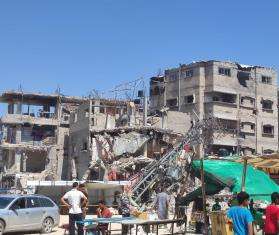Dear Friends,
Doctors Without Borders/Médecins Sans Frontières (MSF) brings lifesaving medical care to people caught in emergencies around the world—war zones, epidemic outbreaks, disasters, or less visible crises brought about by neglect. At the same time, we examine the causes of these situations as best we can, and speak out when we believe our perspective, based on our field experience, can improve the situation for those caught in life-threatening circumstances beyond their control.
In this issue of Alert, we share news and images of our response to the ongoing crisis in Somalia, where MSF has spent the summer trying to expand its services to meet the latest emergency to befall the country’s people. Simultaneously, we have been conveying our perspective on the genesis of this crisis through press conferences, op-ed pieces, interviews, and meetings with diplomatic officials and NGO colleagues. There is a drought afflicting the Horn of Africa, to be sure, but the current emergency, which has driven hundreds of thousands of Somalis from their homes in search of relief and threatens the lives of hundreds of thousands more, is not solely the consequence of a natural disaster.
As our International President, Dr. Unni Karunakara, explained in an op-ed originally published in The Guardian (UK) after he returned from Somalia, there are many other factors behind the crisis, among them the decades of bitter conflict, the wholesale destruction of the country’s infrastructure, rising food prices, and past failures to effectively mobilize and implement international aid and assistance. Saying this is just about drought or just about famine both absolves many parties of responsibility for what is happening now and encourages an approach akin to treating one symptom of a far more complicated disease.
We also look at projects in Libya, Ivory Coast, and Haiti, along with threats to the manufacture of affordable generic medicines and the surprising resurgence of measles, a disease once thought to be on the wane. Some of these situations are more complicated than others, but none is simple. And it is MSF’s goal to use the resources you so generously provide us with to first understand the reasons behind each crisis, and then to implement projects, communications campaigns, and advocacy efforts to bring assistance to as many people as possible.

Sincerely Yours,
Sophie Delaunuay
Executive Director




